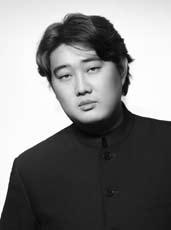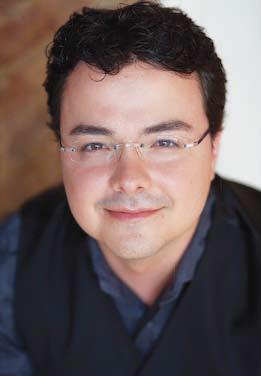向漢斯.賀特致敬
A Tribute to Hans Hotter
舒伯特 (1797-1828)
胡爾夫 (1860-1903)
Franz Schubert (1797-1828)
Hugo Wolf (1860-1903)
《歌者》
《豎琴手》第一至第三首,D 478-480
《流浪者之夜歌》第一首,D 224
《甘尼美》,D 544
《人之界限》,D 716
《普羅米修斯》,D 674
《歌者》
《豎琴手》第一至第三首
《流浪者之夜歌》第一首 《人之界限》
《甘尼美》
《普羅米修斯》
鋼琴 佛拉德.依夫汀格
Der Sänger, Op. 117, D 149
Harfenspieler I-III, D 478-480
Wanders Nachtlied I, D 224
Ganymed, D 544
Grenzen der Menschheit, D 716
Prometheus, D 674
Der Sänger
Harfenspieler I-III
Wanderers Nachtlied I Ganymed
Grenzen der Menschheit
Prometheus piano Vlad Iftinca
獨唱會分為四小節,每節演唱四首歌曲。
The lieder recital consists of four parts with four songs each.
現年24歲的沈
洋,曾獲多個 國際獎項,包 括2008年波 列蒂-布通尼藝
術家獎、2007
年英國廣播公 司卡迪夫世界 歌唱家大賽冠
軍,兩度獲維 羅納舉行的國際歌劇大賽首獎,分別 是2007年《奧菲歐》歌唱比賽及2005 年《唐.喬望尼》歌唱比賽。沈洋灌 錄的唱片舒伯特《冬之旅》,由風林 唱片在中國首度推出。
沈洋生於中國天津,曾就讀上海音樂 學院,師承顧平教授。目前是紐約大 都會歌劇院林德曼青年藝術家發展計 劃及茱莉亞音樂學院歌劇中心成員。
曾接受多位音樂大師的大師班,如占 士.利文、荷西.范丹姆、約翰.費 沙、卡羅.貝貢齊、瑞娜塔.斯科圖、
湯馬士.艾倫及蕾妮.弗雷明等。
沈洋在學時曾於維羅納、上海、特拉 維夫及柏林等地演出《唐.喬望尼》 的馬塞多,《塞維利亞的理髮師》的 唐.巴西里歐及《奧菲歐》的卡朗 特。2009年的演出包括於大都會歌 劇院首演由路易斯.蘭格里指揮的 《唐.喬望尼》的馬塞多、在卡迪 夫英國廣播公司霍迪諾特音樂廳舉 行獨唱會、在香港藝術節和上海大 劇院演出,以及茱莉亞音樂學院贊助 的紐約林肯中心演出。另外,沈洋將 於法國Festival de la Musique et Vin au Clos Vougeot 藝術節舉行多場演 唱會。
24-year-old bass-baritone Shenyang was the winner of the 2007 BBC Cardiff Singer of the World competition and a 2008 winner of the Borletti-Buitoni Trust Award. He also has won First Prize at the International Opera Competition in Verona, the 2007 Verona Orfeo Singing Competition and the 2005 Verona Don Giovanni Singing Competition. Shenyang has recorded Schubert’s Winterreise (Chinese Premiere recording), released by FengLin Records.
Born in Tianjin, China, Shenyang studied with Professor Gu Ping at the Shanghai Conservatory of Music. He currently is enrolled jointly at The Metropolitan Opera Lindemann Young Artist Development Program and at The Julliard School Opera Center. He has attended masterclasses with James Levine, José Van Dam, John Fisher, Carlo Bergonzi, Renata Scotto, Thomas Allen, Håkan Hagegård, Christa Ludwig, Barbara Bonney, Malcolm Martineau and Renée Fleming.
As a student, Shenyang’s operatic roles have included Masetto (Don Giovanni), Don Alfonso (Così fan tutte), Don Basilio (Il barbiere di Siviglia) and Caronte (L’Orfeo) in Verona, Shanghai, Tel Aviv and Berlin. In the leading roles of Fleishman’s Rothschild’s Violin and Mussorgsky’s The Marriage with James Conlon at the Juilliard Opera Center, the New York Times heralded his performances as “impressive” and praised his “husky voice and deadpan demeanor”.
During 2007 Shenyang sang Rossini’s Stabat Mater with Antonio Pappano and the Accademia Nazionale di Santa Cecilia Orchestra and was a featured soloist at the opening concert of the China National Grand Theatre in Beijing. Engagements in 2008 included performances of Haydn’s Die Jahreszeiten with John Nelson at the National Centre for the Performing Arts in Beijing, lieder recitals at Lincoln Center and at New York’s Goethe Institute, a Young Singers Concert with Ivor Bolton at the Salzburg Festival and Brahms’ Liebeslieder Walzer with James Levine and Daniel Barenboim at Carnegie Hall. Highlights of his 2009 calendar include a Metropolitan Opera debut as Masetto in Don Giovanni under the baton of Louis Langrée, solo recitals at BBC Hoddinott Hall in Cardiff, the Hong Kong Arts Festival, the Shanghai Grand Theatre, and in New York at Lincoln Center under the auspices of The Juilliard School. Further appearances include concerts in France at the Festival de la Musique et Vin au Clos Vougeot.
佛拉德.依夫汀格
Vlad Iftinca
鋼琴 Piano
佛拉德.依夫汀格是紐約大都會歌劇 院2008/09年度的助理指揮,並為劇 院的林德曼青年藝術家發展計劃出任 教練。依夫汀格生於羅馬尼亞一個音 樂世家,2004年在紐約曼尼斯音樂學 院獲演唱伴奏碩士學位,2006年於茱 莉亞音樂學院完成研究生課程,師從 布萊恩.賽格、馬歌.加瑞特及戴安 娜.理察遜。依夫汀格曾與多位著名 音樂家合作,包括演唱家湯馬士.漢 普森、伊琳娜.米舒拉、依莎貝爾. 倫納德,鋼琴家暨指揮里昂.弗萊 雪,小提琴家嘉西亞.安塞西歐及中 提琴家傑勒德.科西。
Vlad Iftinca is currently part of the 2008-09 assistant conductors roster at the Metropolitan Opera in New York City where he also holds the position of staff coach in the Lindemann Young Artist Development Programme. Born into a family of artists in Romania, he graduated in 2004 with a Master’s Degree in Vocal Accompanying from the Mannes College of Music, New York City. In 2006 he completed his graduate studies at The Juilliard School with Brian Zeger, Margo Garrett and Diane Richardson. He has collaborated with numerous distinguished singers including Thomas Hampson, Irina Mishura, Isabel Leonard, pianist-conductor Leon Fleisher, violinist Jose Luis Garcia Asensio and violist Gerard Causee.
Goethe (1749-1832)
Harfenspieler I
Wer sich der Einsamkeit ergibt Ach! der ist bald allein; Ein jeder lebt, ein jeder liebt, Und läßt ihn seiner Pein. Ja! laßt mich meiner Qual!
In Germany, the great age of song came in the 19th century. Composers found high inspiration in poetry that sparked the genre known as the lied , European romantic art songs. The beginnings of the tradition are seen in the songs of Mozart and Beethoven, but it is composers such as Schubert and Wolf who balanced the words and music into song cycles that tell the adventures of the soul. One of the greatest inspirations for lieder is Johann Wolfgang von Goethe.
Goethe's works span the fields of poetry, drama, literature, theology, humanism and science. He was a proponent of the central ideas in the movement of Weimar Classicism in the late 18th and early 19th centuries. His influence on German philosophy is immeasurable.
Goethe was one of the key figures of German literature; his two part drama, Faust, is lauded as one of the peaks of world literature. Goethe is considered by many to be the most important writer in the German language and one of the most important thinkers in Western culture.
Und kann ich nur einmal Recht einsam sein, Dann bin ich nicht allein. Es schleicht ein Liebender lauschend sacht, Ob seine Freundin allein? So überschleicht bei Tag und Nacht
Mich Einsamen die Pein, Mich Einsamen die Qual. Ach werd’ ich erst einmal Einsam im Grabe sein, Da läßt sie mich allein!
Harfenspieler II
An die Türen will ich schleichen, Still und sittsam will ich stehn; Fromme Hand wird Nahrung reichen, Und ich werde weiter gehn. Jeder wird sich glücklich scheinen, Wenn mein Bild vor ihm erscheint; Eine Träne wird er weinen, Und ich weiß nicht was er weint.
Harfenspieler III
An die Türen will ich schleichen, Still und sittsam will ich stehn; Fromme Hand wird Nahrung reichen, Und ich werde weiter gehn. Jeder wird sich glücklich scheinen, Wenn mein Bild vor ihm erscheint; Eine Träne wird er weinen, Und ich weiß nicht was er weint.
《豎琴手》第一首
陷入孤寂的他── 不久就孑然一身;
人要活,人要愛 也任由別人受苦。
唉!讓我自己來承受這折磨吧!
能否讓我試一次 真正的孤單, 然後就不會形單影隻。
戀人躡手躡足走過來,聽着: 他的情人孤伶伶嗎? 不分晝夜,總是同樣的: 孤單中,痛苦偷偷來犯, 孤單中,折磨漸漸成形。
唉,到了最後, 我獨自在墓穴中, 痛苦與折磨才會放過我。
《豎琴手》第二首 從不哭着吃的人,
從不在發愁時
坐在床上整晚飲泣的人, 他不認識你啊,天賜的力量! 你引領我們走上生命的道路,
你讓惡人滿心內疚, 然後讓他飽受折磨: 因為內疚感會在人間反擊。
《豎琴手》第三首 我該爬上閘門, 安靜、謙卑地站着, 誠實的手會給我食物, 然後,就該上路了。
人人都顯得高興── 在門前見到我。
他們會淌淚, 而我卻不知道為何。
The Harpist I
He who gives himself up to solitude –Oh he is soon alone; Each man lives, each man loves And leaves the other to his pain. Aye! leave me to my torment!
Can I but once Be truly lonely, Then I shall not be alone. A lover steals softly, harkening: Is his beloved alone? By day and night, in the same way Agony creeps into my solitude, Torment creeps into my solitude, Oh, when at last I shall be Alone within my grave, Then they will let me alone.
The Harpist II
He who ne’er ate his bread with tears, Who ne’er spent the worry-weary night Sitting weeping upon his bed, He knows you not, you heavenly powers! You lead us onto life's path, You let the wretch load himself with guilt, Then leave him to his suffering: For guilt always takes its revenge on earth.
The Harpist III
I shall creep up to their gates, Quiet and modest I shall stand, An honest hand will give me food, And I shall go on my way. Everyone will seem happier On seeing me at their door, A tear will fall from their eye And I'll not know why they weep.
《流浪者之夜歌》第一首
來自天國的你,
平息所有哀傷與痛苦;
對那遭逢不幸的, 你也加倍安慰。
我厭倦了身不由己!
苦苦樂樂,到底所為何事?
甜美的安祥,
來,來我心裏!
《人之界限》
當遠古的
聖父
那平靜的手
自翻騰的雲海
把蒙福的閃電 送到大地,
我親吻
他斗篷的最後一道縐摺,
懷着孩童般的敬畏 在心中深處。
凡人
永遠比不上 神祇。
他站起來,
打擾了 頭上的星宿,
他猶疑的腳步
無處停留
嘲弄訕笑他的 是浮雲清風。
要是
他健壯有力的軀體 穩穩地站在 堅固的地面, 那他的高度 還不能跟橡樹 或葡萄樹 相比。
神與人
有何區別?
一個一個的浪湧來
後面還有一個在徘徊─ 周而復始:
Wanderer’s Night Song I
You who are from heaven, you quiet all sorrow and pain; and he who is doubly wretched you fill with twice as much comfort. Ah! I am tired of being driven! For what is all this pain and joy?
Sweet peace, Come, ah, come into my heart!
Limits of Mankind
When the ancient Holy Father With calm hand From the rolling clouds Sends blessed lightning Over the earth, I kiss the last Seam of his cloak With a childlike awe Deep in my breast.
For with God Shall never compete Mortal Man.
If he lifts himself up And disturbs
The stars with his head, Then nowhere are anchored His uncertain feet, And with him sport The clouds and the wind.
If instead he stands with firm, Vigorous bones, Upon the well-founded and enduring earth, He does not reach up Even to the oak tree, Or the vine
To compare.
What distinguishes God from Man?
That many a wave broke Before the one came wandering — An eternal stream: The wave lifts us;
Verschlingt die Welle, Und wir versinken.
Ein kleiner Ring Begrenzt unser Leben, Und viele Geschlechter Reihen sich dauernd An ihres Daseins Unendliche Kette.
Ganymed
Wie im Morgenglanze Du rings mich anglühst, Frühling, Geliebter! Mit tausendfacher Liebeswonne Sich an mein Herz drängt Deiner ewigen Wärme Heilig Gefühl, Unendliche Schöne!
Daß ich dich fassen möcht' In diesen Arm!
Ach, an deinem Busen Lieg' ich und schmachte, Und deine Blumen, dein Gras Drängen sich an mein Herz. Du kühlst den brennenden Durst meines Busens, Lieblicher Morgenwind! Ruft drein die Nachtigall Liebend nach mir aus dem Nebeltal.
Ich komm', ich komme! Wohin? Ach, wohin?
Hinauf! Hinauf strebt's. Es schweben die Wolken Abwärts, die Wolken Neigen sich der sehnenden Liebe. Mir! Mir!
In eurem Schosse Aufwärts! Umfangend umfangen! Aufwärts an deinen Busen, Alliebender Vater!
《普羅米修斯》 宙斯,用薄紗似的雲朵 掩飾手下諸神,
讓他們繼續像小伙子 砍掉薊草一樣
砍掉橡樹和山峰吧;
但你必須
讓我的世界維持原狀; 還有我的小屋,那不是你建造的; 還有我的壁爐── 那發光發熱的壁爐 你好生妒忌。
普天之下,我沒見過 比你們諸神更下流的了! 你們卑鄙地
依靠奉獻
還有禱告的氣息來滋養,
陛下;
你們會餓死的── 假如孩童和乞丐不是 對你們滿懷希望的傻瓜。
我小時候,
不知就裏,
張着疑惑的雙眼
看着太陽,彷彿比太陽更高的地方 會有耳朵聽見我的悲嘆── 會有顆心像我一樣 憐憫受壓迫的人。
誰來幫我
對抗泰坦神族的傲慢? 誰來救我一命──
擺脫苦役? 還不是全憑一己之力, 憑我那神聖的、發亮的心? 我的心,不是你的美德發着熱切、 充滿朝氣的光芒,
被騙,尚且
對昏睡的諸神滿懷感激?
尊敬你?為什麼?
你有減輕過 受壓者的苦楚嗎?
你有抹乾過
失意者的淚痕嗎?
把我雕琢成人的
Prometheus
Cover your heavens, Zeus, with gauzy clouds, and practice, like a boy who beheads thistles, on the oaks and peaks of mountains; but you must allow my world to stand, and my hut, which you did not build, and my hearth, whose glow you envy me.
I know nothing more shabby under the sun, than you gods! You wretchedly nourish, from offerings and the breath of prayers, your majesty; And you would starve, were children and beggars not such hopeful fools.
When I was a child I did not know in from out; I turned my confused eyes to the sun, as if above it there were an ear to hear my laments a heart like mine that would pity the oppressed.
Who helped me against the pride of the titans? Who rescued me from death from slavery? Did you not accomplish it all yourself, my sacred, glowing heart? Yet did you not glow with ardent and youthful goodness, deceived, and full of gratitude to the sleepers above?
I, honour you? Why?
Have you ever alleviated the pain of one who is oppressed? Have you ever quieted the tears of one who is distressed? Was I not forged into a man by all-mighty Time and eternal Fate, my masters and yours?






